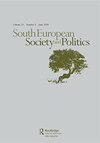When the Lenders Leave Town: Veto Players, Electoral Calculations and Vested Interests as Determinants of Policy Reversals in Spain and Portugal
IF 4.6
1区 社会学
Q1 POLITICAL SCIENCE
引用次数: 12
Abstract
ABSTRACT This article aims to identify the resilience of measures adopted during bailout programmes, and the conditions under which decisions-makers reverse them. Focusing on Spain and Portugal (2014–2019), we calculated that almost half (46 per cent) of the most important measures adopted during the programmes were reversed in the five years following the bailouts. We also show that left-wing parties reversed more than right wing and that the bulk of structural reforms remained unchanged. Using crisp-set qualitative-comparative analysis (QCA), we find that business interests, veto players’ preferences and governments’ electoral calculations are determinants of reversals.当债权人离开:否决者、选举计算和既得利益是西班牙和葡萄牙政策逆转的决定因素
本文旨在确定救助计划期间采取的措施的弹性,以及决策者逆转这些措施的条件。以西班牙和葡萄牙(2014-2019年)为例,我们计算出,在纾困后的5年里,纾困计划期间采取的最重要措施中,有近一半(46%)被逆转。我们还表明,左翼政党的逆转幅度大于右翼政党,而且大部分结构性改革仍未改变。利用crisp-set定性比较分析(QCA),我们发现商业利益、否决权参与者的偏好和政府的选举计算是逆转的决定因素。
本文章由计算机程序翻译,如有差异,请以英文原文为准。
求助全文
约1分钟内获得全文
求助全文
来源期刊

South European Society and Politics
Multiple-
CiteScore
5.80
自引率
21.20%
发文量
14
期刊介绍:
A leading point of reference for scholars of Southern Europe, South European Society and Politics promotes both comparative and inter-disciplinary analyses, as well as offering innovative single county and sub-national studies. The journal acts as a forum for social, economic, cultural, contemporary historical and political approaches to research on the region, and is particularly keen to sponsor policy–focused studies in all these disciplines. The journal publishes research articles; South European Atlas with election reports and articles on other subjects of topical interest, and an extensive book reviews section, including both review articles and individual book reviews.
 求助内容:
求助内容: 应助结果提醒方式:
应助结果提醒方式:


